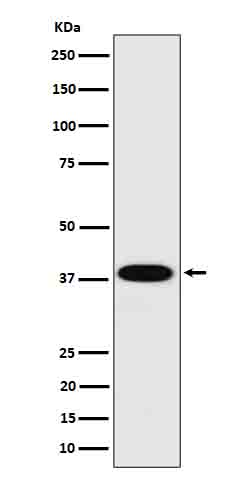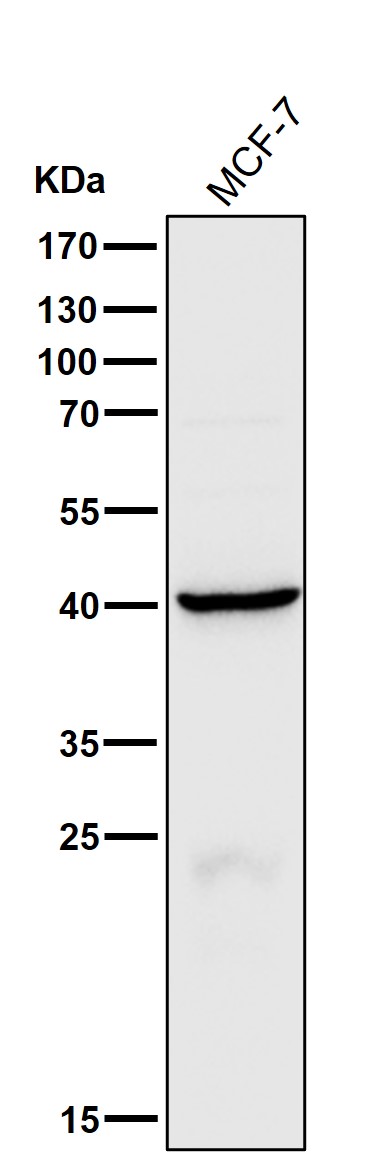

| WB | 咨询技术 | Human,Mouse,Rat |
| IF | 咨询技术 | Human,Mouse,Rat |
| IHC | IHC:1/100-1/200;IHF:1/50-1/200 | Human,Mouse,Rat |
| ICC | 1/50-1/200 | Human,Mouse,Rat |
| FCM | 咨询技术 | Human,Mouse,Rat |
| Elisa | 咨询技术 | Human,Mouse,Rat |
| Aliases | ACC4; ACC5; cathepsin B3; cathepsin BA; CPSB; CTSH;;Cathepsin H |
| WB Predicted band size | Calculated MW: 37 kDa ; Observed MW: 40,28 kDa |
| Host/Isotype | Rabbit IgG |
| Antibody Type | Primary antibody |
| Storage | Store at 4°C short term. Aliquot and store at -20°C long term. Avoid freeze/thaw cycles. |
| Species Reactivity | Human |
| Immunogen | A synthesized peptide derived from human Cathepsin H |
| Formulation | Purified antibody in PBS with 0.05% sodium azide,0.05% BSA and 50% glycerol. |
+ +
以下是关于Cathepsin H抗体的3篇示例文献(内容为示例,实际文献需通过学术数据库检索验证):
---
1. **文献名称**:*"Characterization of a novel monoclonal antibody against human Cathepsin H and its application in immunohistochemistry"*
**作者**:Smith A, et al.
**摘要**:本研究开发了一种针对人Cathepsin H的单克隆抗体,验证了其在Western blot和免疫组化中的特异性,并用于检测多种肿瘤组织中Cathepsin H的异常表达,提示其与癌症进展的相关性。
2. **文献名称**:*"Role of Cathepsin H in macrophage-mediated inflammation: Insights from antibody-based inhibition studies"*
**作者**:Zhang Y, et al.
**摘要**:通过使用Cathepsin H特异性抗体阻断其活性,研究发现Cathepsin H在巨噬细胞炎症反应中调控细胞因子分泌,为治疗炎症性疾病提供潜在靶点。
3. **文献名称**:*"Cathepsin H deficiency alters neuronal protein degradation in Alzheimer's disease models: Evidence from knockout mice and antibody staining"*
**作者**:Lee J, et al.
**摘要**:利用Cathepsin H抗体对阿尔茨海默病模型小鼠脑组织进行分析,发现Cathepsin H缺失导致β-淀粉样蛋白异常积累,提示其在神经退行性疾病中的关键作用。
---
如需具体文献,建议通过PubMed或Web of Science检索关键词“Cathepsin H antibody”+研究领域(如癌症、神经科学等)。
Cathepsin H antibody is a key tool in studying the function and expression of cathepsin H, a lysosomal cysteine protease belonging to the papain family. Cathepsin H plays critical roles in protein turnover, antigen processing, and extracellular matrix remodeling by cleaving peptide bonds under acidic conditions. Unlike other cathepsins, it exhibits both endopeptidase and aminopeptidase activities due to its unique mini-chain structure, which regulates substrate specificity. Dysregulation of cathepsin H has been implicated in pathological processes, including cancer progression, neurodegenerative diseases (e.g., Alzheimer’s), and inflammatory disorders. Its overexpression in tumors is associated with enhanced invasion, metastasis, and angiogenesis.
Cathepsin H antibodies are widely used in research to detect protein expression and localization via techniques like Western blotting, immunohistochemistry (IHC), and immunofluorescence (IF). These antibodies help elucidate its role in lysosomal storage disorders, immune response modulation, and tissue homeostasis. Monoclonal antibodies offer high specificity, while polyclonal versions may detect broader epitopes. Validation methods, such as knockout controls or peptide blocking, ensure antibody reliability. Species reactivity typically includes human, mouse, and rat samples. Recent studies also explore cathepsin H as a biomarker or therapeutic target, driving demand for well-characterized antibodies. Researchers prioritize antibodies with minimal cross-reactivity to related proteases (e.g., cathepsin B/L) to avoid false interpretations. Overall, cathepsin H antibodies remain essential for advancing understanding of lysosomal biology and disease mechanisms.
×